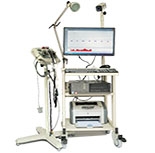Wechat QR code

TEL:400-654-1200

TEL:400-654-1200

Significance and indication of 24-hour ambulatory blood pressure monitoring
For many years, clinic blood pressure has been an important means to diagnose hypertension and observe the curative effect. However, such blood pressure values measured along with blood pressure can not reflect the fluctuation of blood pressure and the blood pressure in active state. 24-hour ambulatory blood pressure monitoring can measure the blood pressure of each person in various states during activity and rest. With the emergence of 24-hour ambulatory blood pressure monitoring, the diagnosis and treatment of hypertension will be more accurate and scientific. Monitor manufacturer
I. What is 24-hour ambulatory blood pressure monitoring
The use of ambulatory blood pressure recorder to measure a person's instantaneous blood pressure within 24 hours of the day and night at intervals of a certain time is called ambulatory blood pressure. Ambulatory blood pressure includes systolic blood pressure, diastolic blood pressure, heart rate, their maximum and minimum values, mean arterial pressure, trough-peak ratio, standard deviation, systolic and diastolic blood pressure load, etc.Meilun

Significance of 24-hour ambulatory blood pressure monitoring
1. Assist in the diagnosis and differential diagnosis of hypertension
(1) Surveillance of hypertension in hypertension-prone population: family history of hypertension, diabetes mellitus, hyperlipidemia, obesity, long-term smoking and alcohol addicts. Monitor manufacturer
(2) Understand whether there are hypertension-related symptoms, such as paroxysmal dizziness, in normal people who come to hospitals or clinics to take blood pressure measurements: for example, some people's blood pressure increases only at night and normal during the day, so-called sleep hypertension.Meilun
Monitor manufacturer
(3) Occasionally measured high blood pressure but no symptoms of hypertension whether there is hypertension: for example, some people in sitting or standing when the blood pressure increases, while lying when the blood pressure is normal, so-called postural hypertension.
(4) Understand whether people who have high blood pressure in clinics or hospitals and normal blood pressure at home have high blood pressure: the so-called white coat hypertension (patients are nervous in front of medical staff, blood pressure reflex increases).
(5) Differential diagnosis of essential hypertension and secondary hypertension: 24-hour blood pressure fluctuation of various secondary hypertension has its particularity. For example, hypertension caused by renal artery stenosis is characterized by persistent elevation of blood pressure, no decrease in blood pressure during night sleep, and no significant decrease after receiving medication. Pheochromocytoma is characterized by paroxysmal hypertension. If the time of blood pressure measurement is the remission period, it is difficult to detect hypertension.
2. Understand the circadian variation of hypertension and the type of dynamic curve, speculate the degree and risk of secondary organ damage, and guide patients to prevent and treat medication.
(1) To understand the relationship between the occurrence time of peak blood pressure and the complications of cardiovascular and cerebrovascular diseases, and to understand the rising speed of blood pressure from the lowest valley to the highest peak (which is positively correlated with the incidence of complications of cardiovascular and cerebrovascular diseases), so as to speculate the risk of complications of cardiovascular and cerebrovascular diseases during this period, and to prompt patients with relevant warnings and preventive measures.
(2) According to the type of ambulatory blood pressure curve, more precisely guide patients to use drugs: 24-hour ambulatory blood pressure can measure the instantaneous blood pressure of individuals at different times, timely understand the law and characteristics of blood pressure fluctuation, and reasonably use short, medium and long-term antihypertensive drugs for the time of peak and trough of blood pressure, so that blood pressure can be stably controlled within 24 hours, effectively prevent damage to target organs such as heart, brain and kidney.
3. It is helpful to distinguish the relationship between angina pectoris and arrhythmia of coronary heart disease and blood pressure, and to understand the relationship between blood pressure changes and angina attack or myocardial ischemia of electrocardiogram (the latter should record ambulatory blood pressure and ambulatory electrocardiogram simultaneously). 4. Ambulatory blood pressure is of great significance in judging prognosis. Studies have confirmed that the mortality and the incidence of the first cardiovascular disease in patients with 24-hour average high blood pressure are higher than those in patients with 24-hour average normal or low blood pressure.
Indications of 24-hour ambulatory blood pressure monitoring
1. Blood pressure was measured in hospital and normal blood pressure was measured at home.
2. Newly discovered hypertension;
3. Hypertensive susceptible population (such as 130-139/85-89mmHg, obesity, family history of hypertension).
4. Differential diagnosis of secondary hypertension;
5. Those who are not satisfied with blood pressure control after antihypertensive drugs treatment;
6. Patients with history of syncope or positional hypotension should be examined simultaneously with 24-hour ambulatory electrocardiogram.
7. To guide the application of antihypertensive drugs in clinic, to evaluate the effect of drugs and to judge the prognosis of hypertension.